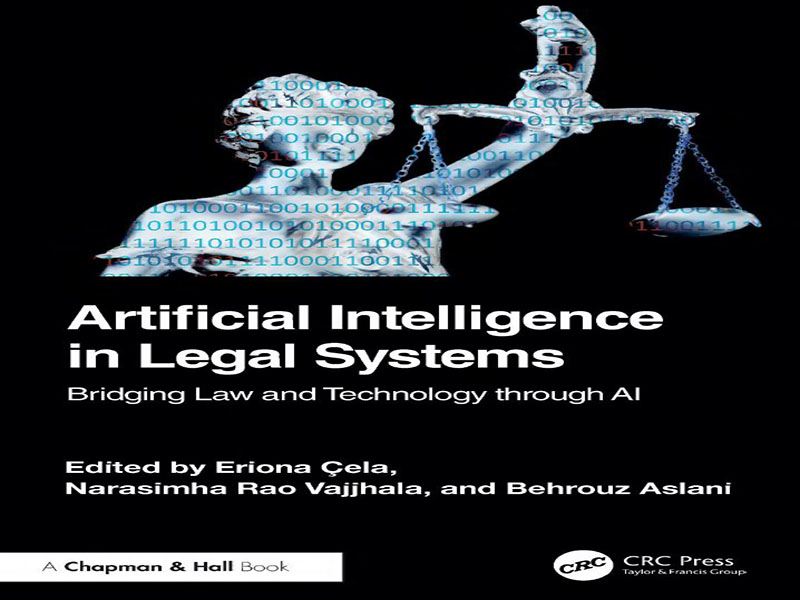- عنوان کتاب: Artificial Intelligence in Legal Systems -Bridging Law and Technology through AI
- نویسنده: Eriona Çela
- حوزه: کاربرد هوش مصنوعی
- سال انتشار: 2025
- تعداد صفحه: 201
- زبان اصلی: انگلیسی
- نوع فایل: pdf
- حجم فایل: 1.54 مگابایت
این کتاب، تحلیلی جامع از تأثیر دگرگونکننده هوش مصنوعی (AI) بر چارچوبهای حقوقی در اتحادیه اروپا و فراتر از آن ارائه میدهد. این کتاب هم مزایای نویدبخش هوش مصنوعی در بهبود دسترسی به عدالت و هم چالشهای مهمی را که مستلزم چارچوبهای نظارتی متفکرانه و همکاری بین رشتهای است، نشان میدهد. این کتاب کاربردهای گسترده هوش مصنوعی، از مدیریت پرونده گرفته تا تجزیه و تحلیل پیشبینیکننده، را برجسته میکند و در عین حال چالشهای اخلاقی و پیامدهای قانونی را نیز بررسی میکند. این کتاب به موضوع مهم حفاظت از دادهها در زمینه فناوری مبدل مولد از پیش آموزشدیده (GPT) میپردازد و بر تعهد اتحادیه اروپا به حقوق حریم خصوصی افراد تأکید میکند. این کتاب همچنین نقش هوش مصنوعی را در حکومتداری عمومی، با استفاده از آلبانی به عنوان یک مطالعه موردی، ارزیابی میکند و پتانسیل فناوری بلاکچین را در بهبود فرآیندهای حقوقی بررسی میکند. ظرافتهای اخلاقی پیرامون ادغام هوش مصنوعی در سیستمهای حقوقی، به ویژه در مورد سوگیری الگوریتمی و نظارت انسانی، به طور انتقادی بررسی شده است. این کتاب از یک رویکرد مشارکتی شامل کارشناسان حقوقی و دانشمندان داده برای پیمایش مؤثر این پیچیدگیها حمایت میکند. این کتاب منبعی کلیدی برای دانشجویان تحصیلات تکمیلی، پژوهشگران و متخصصان حقوقی است که به دنبال درک بهتر مزایا و خطرات استفاده از هوش مصنوعی در رویههای حقوقی هستند.
This book presents a comprehensive analysis of the transformative impact of artifi‑cial intelligence (AI) on legal frameworks within the European Union and beyond. It illustrates both the promising benefits of AI in improving access to justice and the significant challenges that necessitate thoughtful regulatory frameworks and inter‑disciplinary cooperation. This book highlights the expansive applications of AI, ranging from case man‑agement to predictive analytics, while also scrutinizing ethical challenges and legal implications. It addresses the pressing issue of data protection in the context of Generative Pre‑trained Transformer (GPT) technology, emphasizing the EU’s com‑mitment to individual privacy rights. This book also evaluates AI’s role in public governance, using Albania as a case study, and examines the potential of blockchain technology in enhancing legal processes. The ethical nuances surrounding AI’s inte‑gration into legal systems are critically examined, particularly regarding algorithmic bias and human oversight. This book advocates for a collaborative approach involv‑ing legal experts and data scientists to navigate these complexities effectively. This book is a key resource for postgraduate students, researchers, and legal pro‑fessionals seeking to better understand the benefits and risks of incorporating AI into legal practice.
این کتاب را میتوانید از لینک زیر بصورت رایگان دانلود کنید:
Download: Artificial Intelligence in Legal Systems



































نظرات کاربران